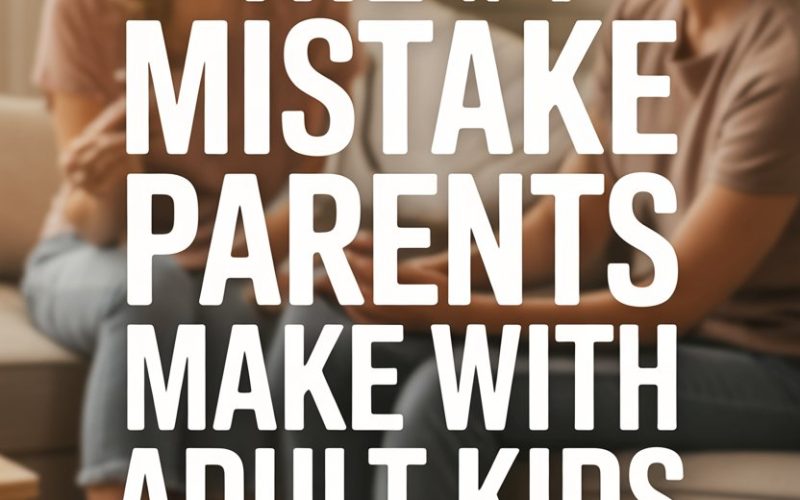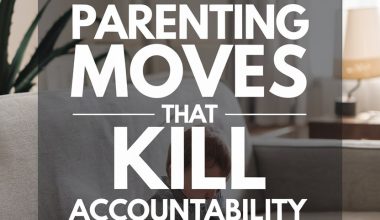Admit it: you thought the wild ride of parenting would calm down after the last high school graduation. Maybe you even treated yourself to a nap or two.
But then your grown child called about a job crisis, asked for your Netflix password, or—bless them—requested help with taxes.
Turns out, parenting adult kids is less “fade to credits” and more “spin-off series no one warned you about.”
Here’s the truth. The most common mistake parents make with their adult children isn’t about money, values, or even letting them turn the garage into a podcast studio.
It’s something sneakier. Something we all do, in the name of love.
Trying to Solve Their Problems (Even When They Don’t Ask)
Most parents spent decades as Chief Problem-Solver. Who else would know the right cough syrup, the best way to get gum out of hair, or how to craft an apologetic email to a teacher?
This fixer instinct isn’t easy to switch off once your child starts paying council tax (or at least claims to).
But constantly leaping in as the hero can actually stunt your child’s independence.
Adult kids need to know we believe in their ability to handle life’s curveballs—even the ones that lead to awkward household plumbing issues.
Still not convinced? Clinical psychologist Dr. Lisa Damour says in her New York Times interview that while support is lovely, unsolicited advice can feel like criticism. Cue the sighs heard round the country.
How This Mistake Sneaks Up on Good Parents
Picture this: your grown child rings you, voice frazzled, and details the latest work debacle. Before they finish, you’re already firing off solutions—texting links, phoning your cousin’s friend’s boss, mapping their next five moves.
You mean well, of course. You want to help.
Here’s the rub: sometimes they just want a sounding board, not a rescue squad.
When we rush in, we unintentionally send the message, “I don’t trust you to figure this out.” That’s not our intent, but it’s often how it lands.
Even trickier, adult kids sometimes ask for advice without wanting us to take over. “What do you think?” is not code for “Plan my life and call HR.”
Why It’s So Tempting to Step In
Let’s be honest, it’s hard to watch someone you love struggle. Especially if you know (or think you know) a shortcut.
The urge to bubble-wrap your twenty-something against disappointment is primal. You’ve been fixing things for years—what’s one more little nudge?
But as broadcaster Esther Perel points out, parental over-involvement can slow down a young adult’s learning curve. Growth comes from doing, not just hearing about what someone else would do.
Spotting the Signs: Are You Over-Helping?
If you’re not sure whether you’ve crossed the line from supportive parent to helicopter mechanic, look for these clues:
- You feel anxious when your child faces a challenge, and you can’t rest until you “fix it.”
- Your adult child calls you for advice, but conversations end with them sounding flat or frustrated.
- You’re handling practicalities for them routinely: booking appointments, editing resumes, filling in official forms.
- You secretly (or not-so-secretly) judge their decisions—then try to course-correct.
If you ticked one or more, welcome to the club. There are biscuits at the next meeting.
What Happens When Parents Keep Solving Everything
You might think you’re lightening their load, but persistent intervention can breed resentment and dependence. It can also send the not-so-subtle message that “Mum/Dad doesn’t think I’m capable.” Cue confidence wobble.
A Stanford study found that young adults whose parents over-managed had higher anxiety and less self-efficacy. Not the outcome you were hoping for, is it?
Setting Boundaries That Don’t Feel Like Rejection
You’re not cold-hearted for stepping back. In fact, setting boundaries is a sign of trust and respect.
Here’s how you can start tonight—without staging a dramatic family intervention or deleting their contact from your phone.
- Next time your adult child shares a problem, listen fully before offering input.
- Ask, “Would you like advice, or do you just want to vent?”
- Resist the urge to immediately brainstorm solutions—let the silence do the heavy lifting. (It’s uncomfortable, but growth happens there.)
- If you must weigh in, frame it as a suggestion: “Here’s what I might try, but I trust you to handle this.”
- Practice saying, “I have faith you’ll figure it out”—and mean it.
Your child might bristle at first, but deep down, they’ll appreciate the vote of confidence.
And if you need to, go yell into a pillow about how much better your way would have been. No one will judge.
Staying Connected Without Micromanaging
Backing off doesn’t mean vanishing! Adult kids still need their parents, just minus the daily checklists. Find new ways to connect that don’t revolve around fixing.
- Invite them for dinner without grilling them about their job hunt.
- Send a silly meme instead of a TED Talk on budgeting.
- Ask open-ended questions: “What’s something you’re proud of this week?” feels less intrusive than “How many CVs did you send today?”
Family therapist Jeffrey Bernstein suggests focusing on curiosity, not control. Celebrate their wins, empathize with their losses, and remind yourself: you’ve raised a capable human.
When They Really Do Need Help
Sometimes a grown child actually requires intervention—think mental health crises, financial disasters, or serious health problems. The key here is to step in with compassion, not control.
- Ask permission before offering help: “Would you like me to get involved?”
- Be clear about what you can (and can’t) do.
- Respect their autonomy, even as you lend a hand.
You’ll know you’ve struck the right balance if your child comes to you when it matters—and trusts you enough to handle the little stuff on their own.
What To Do Tonight
Tonight, try listening more than you talk the next time your adult child calls.
Ask if they want advice, or just someone to hear their rant about Steve from Accounting. Bite your tongue when you feel the urge to fix.
It’s harder than it sounds, but you can do it. And if you slip, forgive yourself.
Parenting isn’t about getting it perfect, especially when the grown-up kids keep moving the goalposts.
Why Letting Go Is a Gift
Letting your adult kids make their own calls—even the head-scratching ones—isn’t neglect. It’s love in its bravest form.
Every time you resist the urge to orchestrate their lives, you hand them the keys to their own adulthood.
They might fumble a bit, but they’ll figure it out—just like you did. And you’ll still be there, cheering them on, cup of tea (or glass of wine) in hand.
That’s not a mistake. That’s parenting grown-up style.





